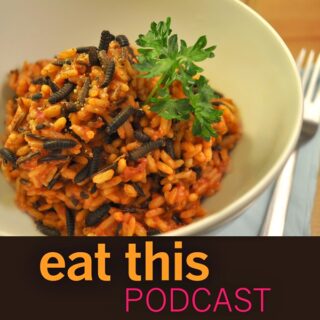
Podcast: Play in new window | Download (Duration: 23:24 — 21.5MB)
Subscribe: Google Podcasts | Spotify | Android | RSS | More
 If only we could get over our squeamishness, insects can save the planet, banish hunger, protect the rainforests and reduce the climate catastrophe. At least, that’s what article after article tell us as they sing the praises of feeding our food waste to insects like the larvae of the black soldier fly. Insects can grow 5000-fold in 12 days, producing prodigious quantities of protein in less than 100th the space of soya beans.
If only we could get over our squeamishness, insects can save the planet, banish hunger, protect the rainforests and reduce the climate catastrophe. At least, that’s what article after article tell us as they sing the praises of feeding our food waste to insects like the larvae of the black soldier fly. Insects can grow 5000-fold in 12 days, producing prodigious quantities of protein in less than 100th the space of soya beans.
There’s just one fly in the ointment, so to speak. Most of the food that insects are fed isn’t waste at all, and after absorbing large amounts of investor cash, some of the biggest companies have gone bust. Dustin Crummett, executive director of the Insect Institute, shared his many reasons for saying that eating insects will not save the planet.
Notes
- Dustin Crummett is executive director of The Insect Institute. His paper: Is turning food waste into insect feed an uphill climb? A review of persistent challenges.
- If not food or feed, how about “valuable raw materials for various industries”?
- Here’s the transcript. You can thank the donors, and become one yourself.
- Cover photograph from designer Katharina Unger’s Farm 432 concept, “a fly-breeding device for home use that continually collects fly larva as a protein source for less squeamish diners”
- Banner photo by Muhammad Mahdi Karim from Wikimedia shows black soldier flies making more black soldier flies.

Somewhat sad to see Marion Nestle, with whom I almost always agree, linking, without question or comment, to an article in a pet-food trade journal…
Crunch Time: Insects Are Not Going to Save Us – Eat This Podcast by Jeremy Cherfas
Many years ago, I remember eating a bag of crickets cooked in oil and garlic in Phnom Penh. I have always wondered about the prospect of insects ever since. This is clearly not the case.
The discussion of feed used to develop insects reminded me about Johann Hari’s discussion of processed food in his book Magic Pill:
Source: Magic Pill by Johann Hari